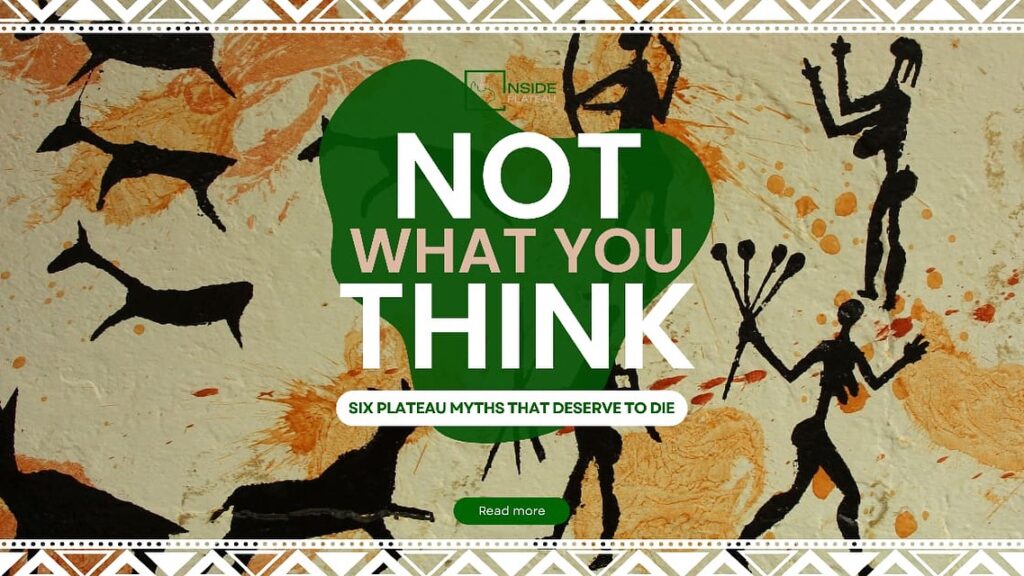If you’ve ever heard someone say “Jos is Plateau” or “all Plateau people are Hausa,” you have brushed against a cultural shortcut that feels tidy, but tells a lie. These myths are like blurry photographs: they reduce the state to half-truths, making the unseen parts invisible. But, Plateau State, with its 17 local government areas and more than 40 ethnic groups, is a whole tapestry—one that deserves to be looked at closely, thread by thread.
Let’s walk through six of the biggest misconceptions, not just to name them, but to paint the reality so clearly that the next time you hear one, you’ll know exactly why it is wrong.
1. “Jos is the state”
Picture this: a journalist on TV says, “Violence erupts in Jos, the Plateau State capital.” Fair enough. But the next headline simply reads, “Jos clashes continue,” even when the incident is in Barkin Ladi, 30 kilometers away. Slowly, Jos becomes shorthand for the entire state, and Plateau’s identity shrinks to a single city.
The truth? Plateau State has 17 LGAs. Jos is just three of them: Jos North, South, and East. Pankshin bustles with its Monday market, Langtang pulses with Tarok festivals, and Shendam has its own political weight. When you call everything “Jos,” you erase these other places from the picture, as though they don’t matter. It’s like calling all of Lagos “Ikeja” or “Lekki” and pretending that areas like Makoko, Iwaya, or Bariga do not exist.
So the next time you talk about Plateau, name the town. Pankshin. Langtang. Shendam. Each is part of the state’s heartbeat, none any more or less Plateau than the rest.
2. “Everyone from Plateau is Hausa.”
Walk through Terminus Market in Jos, and you’ll hear a chorus of voices: Hausa haggling over yams, Berom sellers switching into English for a customer, an Ngas trader laughing in his mother tongue, and snippets of Pidgin weaving it all together. Hausa dominates the marketplace, yes, but as the language of commerce, not as the definition of identity.
Plateau is home to over 40 ethnic groups, including Berom, Afizere, Anaguta, Ngas, Tarok, Goemai, Mwaghavul, among many more. Each has its own language, foods, songs, and histories. Hausa became a bridge language because commerce demanded it. But confusing lingua franca for ethnicity is like saying everyone in Switzerland is French because they trade in French—it flattens identity into convenience.
Call Plateau people Hausa, and you erase their names, their languages, their festivals. Better to say: “Hausa is widely spoken here, but the people are proudly Berom, Ngas, Tarok, Afizere, and beyond.”
3. “Religious groups live apart here.”
It’s easy to reduce Plateau to headlines about crises. And yes, those tensions are real. But if you walk into a Plateau market on a busy morning, you’ll see something else: a Muslim trader and a Christian vegetable seller sharing the same stall space; schoolchildren from both faiths lining up in the same classrooms. It is not unusual to find one brother heading to the mosque on Friday while his sister sings in the church choir on Sunday—the same family, two faiths, living side by side.
Beyond the markets, structured interfaith work is ongoing. The Jos Forum, for example, brings together Afizere, Anaguta, Berom, Hausa, Fulani, Igbo, Yoruba, and others to keep dialogue alive. These aren’t just meetings—they are joint declarations, committees, and peace projects.
So yes, Plateau has scars. But it also has remarkable everyday coexistence. To talk only about conflict is to miss the quiet, daily handshakes that never make the news.
4. “All Plateau Christians are COCIN.”
Say “Christianity” in Plateau, and most people think COCIN (Church of Christ in Nations). And they’re not wrong—COCIN is huge, headquartered in Jos, with a history that dates back over a century. But assuming all or most Christians here are members of this one denomination is like assuming all Yorubas attend White Garment churches.
Plateau State is alive with denominational diversity. ECWA (Evangelical Church Winning All) has seminaries like JETS (Jos ECWA Theological Seminary), the Roman Catholic Archdiocese of Jos runs schools, parishes, and charities, the Anglican Diocese has its own footprint, and Pentecostal churches—from Redeemed to smaller independent fellowships—dot every town.
This isn’t one choir, it’s a symphony. To say “all Plateau Christians are COCIN” is to silence hundreds of other voices singing in harmony.
5. “Plateau people are only farmers.”
Yes, Plateau is fertile. Tomatoes, potatoes, maize, and vegetables grow in such abundance that Plateau is called Nigeria’s “food basket.” But stop there, and you miss the fuller story.
Plateau is also a hub of knowledge and industry. The University of Jos trains thousands of students. The National Veterinary Research Institute in Vom leads animal research across West Africa. Jos University Teaching Hospital serves as a referral center. Blacksmiths in Wase still hammer metal into tools; artisans in Riyom weave baskets; and musicians in Jos mix hip-hop with local drums.
Imagine only seeing Plateau as farmland it’s like looking at a library and only noticing the cookbooks, ignoring the science, art, and literature. Farming feeds the Plateau, yes, but creativity, scholarship, and craftsmanship define it too.
6. “Culture = traditional religion.”
Culture is often mistaken for rituals and ancestral practices alone. Outsiders think of masks, shrines, and ceremonies frozen in time. But culture in Plateau is alive, flexible, and constantly reinvented.
Take the Nzem Berom Festival: a celebration that marks the farming season, with dancers in beads and feathers drumming rhythms handed down for generations. Yet watch closely and you’ll see youths filming TikToks, remixing those moves into pop-dance challenges. Or the Ngas Puusdung Festival, which once gathered clans in village squares but now draws crowds in stadiums, boosted by tourism.
Culture here is not a museum piece. It’s a living river, carrying heritage forward while adapting to new currents fashion, music, tourism. To call it “just traditional religion” is to miss its vibrancy in the everyday.
Why Myths Hurt
Stereotypes are convenient. They shrink a state of millions into one word—Jos, Hausa, farming. But every time we repeat them, we make someone invisible. We erase Pankshin’s markets, Langtang’s Tarok stories, Mwaghavul songs, Afizere foods, or ECWA’s seminaries. And when people are invisible, they’re overlooked—in policy, in budgets, in how their culture is valued.
Key Take Away
Plateau is not what the shortcuts say. So the next time you hear someone say “Jos is Plateau” or “they’re all Hausa,” don’t let it slide. Correct it. Paint them a fuller picture. Show them the market stalls, the festivals, the schools, the hills, and the hands of people who together make Plateau a state of many colors, not one. Because the truth is richer, and Plateau State deserves to be seen in full.

